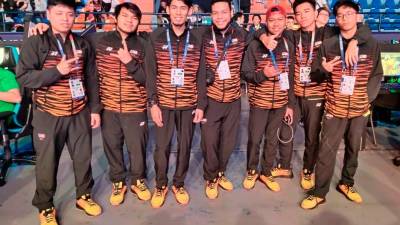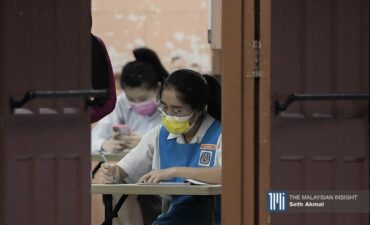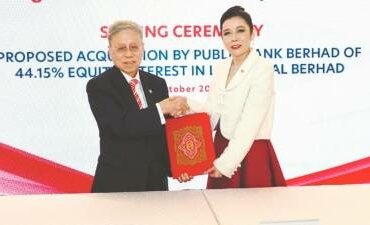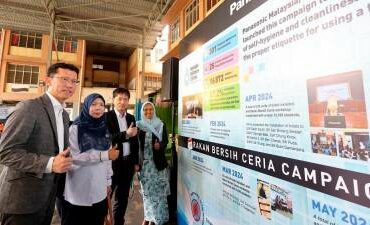THE social media world, especially TikTok, plays a crucial role in shaping global perspectives. TikTok’s worldwide popularity is attributed to its user-friendly interface and adept algorithms, which break down complex topics into engaging videos.
Recently, TikTok ran a Mental Health Awareness campaign, demonstrating its impact on reshaping the understanding of mental health.
Through short videos, TikTok is not just increasing awareness about mental health but also making it easier for people to access support services.
The platform actively encourages learning and knowledge-sharing, featuring insights from content creators like Lapheltzy, who opened up about his struggles with attention deficit hyperactivity disorder (ADHD) autism spectrum disorders (ASD), and mental health expert Dr Hazli Zakaria.
Lapheltzy whose real name Aiman Kamal is a TikTok content creator and mental health expert who works as an eSports analyst as well as a respected commentator for top-tier eSports tournaments.
Starting as a coach in 2020, he later managed Axis eSports, winning Best Talent for MPL Malaysia seasons 10 and 12. His impact on Malaysian gaming earned him a Best of Gaming nomination at the TikTok Awards.
Beyond gaming, Lapheltzy serves as a mental health advocate on TikTok, sharing personal experiences to raise awareness. His candid content, including a discussion about his recent ADHD and ASD diagnosis in a TikTok live session, contributes to meaningful conversations about managing emotions.
Hazli, founder of Alaminda Healthcare Berhad and Clinical Director of Alaminda, is an experienced clinical psychologist specialising in mood disorders such as depression, anxiety, bipolar disorder, adult ADHD, addiction and psychotherapy.
Additionally, he served as the past president of the Malaysian Psychiatric Association (MPA) and is a dedicated TikTok content creator actively enhancing mental literacy awareness in the country.
In their recent conversation with theSun, they explored ways to reduce stigma and foster a supportive community around mental health.
As an online mental health advocate, why did you want to raise awareness in your community?
Lapheltzy: In Asian culture, discussing such matters is often considered taboo. Prolonged suppression of negative emotions can have detrimental effects. The longer we endure, the more severe the consequences become.
How do you help players manage their mental health as a coach or manager?
Lapheltzy: Discussing mental health is crucial. While physical activities such as sports and meditation contribute to a solid foundation for mental well-being, I emphasise the strength of open communication.
As someone who regularly attends therapy, I recognise the power of talking about it. This understanding motivates me to learn and engage in conversations with my players and friends.
Is there enough awareness about mental health in Malaysia?
Lapheltzy: Absolutely not. For many individuals, it becomes a guessing game, as people tend to ignore or self-diagnose instead of seeking professional help. In my case, it required a hospital visit and considerable expenses on various scans to determine that my issue wasn’t physical but rather mental.
Dr Hazli: While there has been notable progress in increasing mental health awareness in Malaysia, there is still considerable work to be done. Although there has been a positive shift in recognising the importance of mental well-being compared with earlier times, there is ample room for more awareness, growth, education and acceptance in this field.
Do social media and the internet help to spread these messages and reduce mental health stigma?
Lapheltzy: The goal is to normalise it. Increased exposure and assurance from others that it’s okay contribute to a greater level of comfort in seeking professional help.
This aspect should be emphasised — acknowledging that something is wrong is the first step, and taking action, such as consulting a professional, is a crucial follow-up.
Dr Hazli: Digital platforms and social media, when used responsibly, serve as powerful tools for spreading mental health awareness and increasing access to support systems.
These platforms, such as TikTok, enable the dissemination of accurate educational content, providing reliable information about mental health and its accessibility to a broader audience.
Moreover, these platforms create a safe and non-judgemental space where individuals can openly share their mental health experiences, fostering honest and supportive conversations.
Challenging the stigma associated with mental health is crucial for promoting open dialogue, encouraging help-seeking behaviour and enhancing understanding of mental health conditions.
Education plays a pivotal role in dispelling these stigmas, ensuring that individuals and society are well-informed about mental health conditions, triggers and available support options.
How can internet users and gamers make TikTok and their online gaming communities safer?
Lapheltzy: Be friends. Foster understanding. While you can’t control most things in the world, embodying friendliness and empathy can be contagious.
It begins with each individual asking, What can I do on my own? As echoed by seven billion people. Do you think posting and interacting on TikTok has helped Malaysians understand mental health?
Dr Hazli: As a TikTok creator, I’ve witnessed the platform’s powerful impact on the conversation about mental health in Malaysia. By utilising TikTok as a tool to bring this topic to the forefront, we are not only making it more accessible but also relatable to a broader audience. This has significant potential to encourage real mental health discussions, clarify the confusion, and avoid stigma, especially among the next generation.









